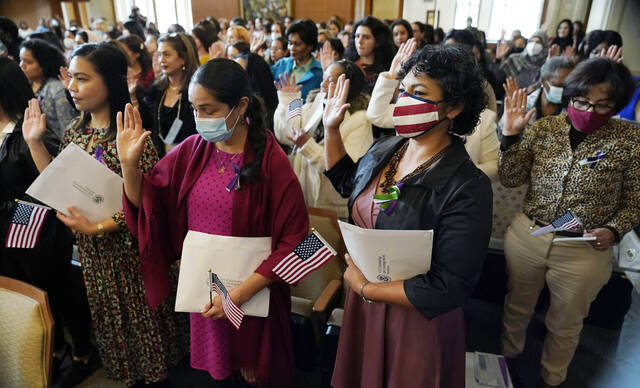Many of us dream of winning the Powerball or Megamillions jackpots and fantasize what we would do with the money — quit our jobs, travel to foreign places, buy a new car, help out family and friends, support our favorite charities.
Few of us, though, realize that we already have won a lottery. We didn’t even need to buy a ticket or guess a lucky number.
This past fall, more than 13 million people around the world submitted entries to a lottery for a chance to win a prize that we already possess. From all those entrants, in early May, 100,000 names will be drawn, and 55,000 people will ultimately be selected to receive the prize.
While the prize isn’t some multi-million dollar payout, expense-paid vacation, new home, boat, car or other jackpot, the value of it for many of those competing is viewed as being greater than those material items.
What is this contest? Welcome to the annual Diversity Visa Program lottery run by the U.S. State Department, also known as the green card lottery.
Those fortunate enough to have their names drawn gain the opportunity to receive a green card to come to our country and ultimately become citizens and pursue their dreams.
The Diversity Visa Lottery was instituted with the passage of the Immigration Act of 1990. Its goal is to diversify the immigrant population in the United States by selecting applicants mostly from countries with low numbers of immigrants to the U.S. over the previous five years.
To even be eligible for one of the visas through the lottery, a person must have an education at least equivalent to an American high school diploma or have worked for at least two years, over those previous five years, in a profession that requires at least two years of training.
The value of winning might be life-changing for those chosen. Many who apply live in some of the poorest and most dangerous areas of the world, where food, clean water and medical care may be in short supply. Some come from war-torn, crime-ridden countries where day-to-day survival is a challenge. Basic utilities and services that are common to us, such as electricity, running water, telecommunications and sewer systems, may be rare. Entrants from countries such as the Sudan, Somalia and Nigeria have a life expectancy that is 25% shorter than those in the U.S.
Being selected in the lottery doesn’t guarantee a green card. Those selected must complete an extensive application and provide certain materials, as well as pass an interview with the U.S. Embassy in their country. Even if they satisfy all of the requirements, they might still fall short, as visas are granted on a first-come, first-served basis.
To understand the importance of the lottery to those in less-fortunate countries, one only needs to look at Sierra Leone in Africa, which is ranked as the fifth poorest country in the world with an annual per capita income of $490. Sierra Leone has a population of 8.1 million people, and, in the 2020 lottery, almost 948,000 people, or over 11% of the entire population, entered.
Stories of those who have “won” the Diversity Visa Program lottery and received a green card, and ultimately become citizens, are heartwarming. One noted the simple act of going to the mailbox and sending or receiving letters on a regular basis as something special. Another mentioned the ability to go into a grocery store and see so many foods. Others speak of walking down the street without fear of the police, military or gangs stopping them, and the opportunities for employment and education.
Many of these people and their families tend to be our proudest and most appreciative citizens.
During this difficult time in the world, when we are witnessing such wanton destruction, loss of life and displacement of families in Ukraine, we can reflect on our good fortune. While our country may have its shortcomings and faults, the Diversity Visa Program is proof that the U.S. remains a beacon of hope and promise to many throughout the world, and that the American dream still exists.








